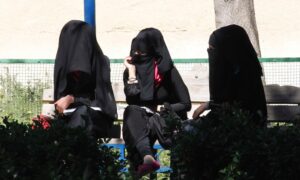
By Michael Ashcraft and Mark Ellis
Life in ISIS territory is harsh, especially for women who are arrested and sentenced to lashes and fines for not wearing a double black veil and baggy clothes that hide any semblance of femininity, according to a report in The Guardian.
Hair salons have been shuttered, and female doctors are finding no exceptions to the stringent rules of the new “caliphate” in the major cities of Mosul, Raqqa and Deir el-Zour in the land seized by Islamic State soldiers last year. The new rules, published in a “manifesto,” include being accompanied by a male guardian – a mahram – at all times outside of the house. Women who do not comply are forced off buses and taxis.
“It is a big problem as I do not have any brothers; we are only five sisters.” says Sama Maher, 20, of Raqqa, who’s had run-ins with religious police, known as Hisbah, for violating Isis rules. “I had to quit my university studies in Aleppo because I’m not allowed to cross the checkpoints without a mahram and leave the city by myself like before.”
According to the new rules, girls can be married off even against their will from age nine. The exclusively male ISIS leadership believe they have instituted an idealized society, one that will hasten the Muslim version of the Christian end of the world.
Moderate Muslim women quickly found it futile to protest the rules. They have suffered humiliations, beatings and fines. Men are subject to punishment for the public behavior of their wives and daughters too, so many are obliging their female family members to stay home.
“The Hisbah would hit a woman on her head with a stick if she was not wearing a veil,” says Maha Saleh, 36, a pediatrician. “At the beginning, some female doctors refused to wear veils and went on a strike by staying at home. Hisbah took ambulances and went to their houses and brought them by force to the hospital. One of my colleagues was alone in her clinic in the hospital and thought it was all right to strip off her veil. All of a sudden, two Hisbah broke in her room and reproached her for not wearing the veil and warned her not to do that again.”
Even women in labor arriving in hospitals are being refused admittance if they don’t wear the veil. “I saw some women in labor who seemed to be in a panic and did not have time to wear a veil,” Saleh says. “I was shocked to see that they were denied access to the hospital unless they put veils on their faces.
New rules and warnings of punishment are posted in shops and online.
Mosul resident Sabah Nadiem panicked when he lost track of his wife in a busy market. “I went with my wife to one of the old souqs to do some shopping, and after a short while I lost her among the crowd,” he says. “The problem was that all the women were wearing veils and it was hard to know who was my wife. I was utterly scared to make a mistake and go for the wrong woman. It would be a disaster to fall into Hisbah hands. I could not even use my mobile as the network was down.”
The stifling rules apply also to children, as Sami Hadi found out last October. When schools opened in Mosul, the mother of five sent her two daughters — Hala, 6, and Tiba, 7, — to school without a hijab.
“After two days, the headmistress told them that they all have to wear the hijab when they come to school. So I made them wear the hijab. Then an Isis order came to stipulate that only girls in 4th, 5th and 6th class in primary school have to wear hijab, not 1st and 2nd classes.”
As it was her family’s only source of income, Samah Nasir, 43, flouted new rules banning hair salons. “I had nothing to feed my children and pay for my husband’s medications,” she says. The Hisbah arrested her and her husband. The Shariah court judge fined her $1,500 and ordered 10 lashes on the soles of her feet to be administered in a room nearby, she says.
Even though women older than 45 are exempted from the veil, they find themselves in difficulty without it. Saleh recounts how a taxi driver refused to take a passenger. “The taxi driver turned to the woman and said: ‘Why are not you wearing a veil?’” Saleh says. “She told him that Isis said the veil was imposed on women who are less than 45. The driver answered: ‘I’m afraid if I have you in my car, Isis Hisbah will stop me at a checkpoint and fine me.'”
Bus drivers are also busted for accepting female passengers without a male guardian mahram. “If Hisbah spot a woman without a mahram in a bus, the whole bus is evacuated and sent back because the driver accepted her,” Maher says.
If the last passenger of a bus in Mosul is female, she’ll be forced off, regardless of how far her destination. Bassma Adel, 35, a bank worker, had to get off a bus miles from home.
“I had to walk to my house though the distance was long in inclement weather,” Adel says. “One of my male colleagues passed by in his car and offered to give me a lift. We drove for a short distance before we were spotted by Hisbah. They asked us for a document that proves my colleague was a mahram to me. When we failed to do that, they reproached us for being together in the car and humiliated us and ordered me to step down.”



